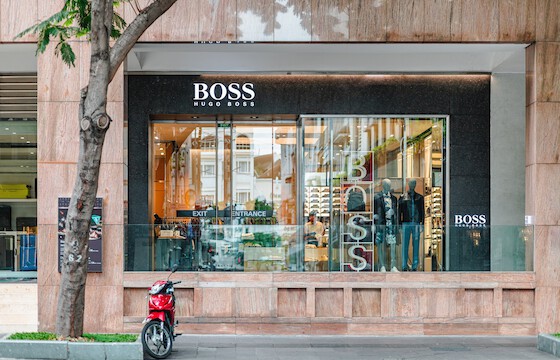1. CASE SUMMARY
A. Summary of facts
This case concerns unlawful retail price maintenance and concept stores' obligations to report sales prices and contribution margins for each item through a joint IT-system.
Bestseller is part of the Bestseller Group. The group is engaged in the sale of clothing and related products, including many well-known mainstream Danish brands. Bestseller had agreements with 108 independent concept stores. The concept stores exclusively sold the Bestseller brands Vero Moda, ONLY, JACK & JONES and/or EXIT.
On 9 May 2001, Bestseller requested a declaration of non-intervention, cf. section 9 of the Danish Competition Act, or alternatively an individual exemption, cf. section 8(1) of the Danish Competition Act, if a declaration of non-intervention could not be granted. The request concerned "The Bestseller Wheel" which contained guidelines for the operation of the stores.
The DCC found that neither of the aforementioned exemptions applied and ordered Bestseller to remove the provisions restricting competition. Bestseller accepted to remove the provisions with obligations to follow the recommended prices, but Bestseller refused to change the obligation to report retail prices ad contribution margins in its joint IT-system. The appeals case only concerned the order to remove the reporting obligation in the joint IT-system. The appeals case ended in the Danish Western High Court ('DWHC'), where the court ruled that the joint IT-system were in violation of section 6(1) of the Danish Competition Act.
The DWHC thereby upheld the decisions of the DCC and the Danish Competition Appeals Board ('DCAB').
B. Notes on case history
On 27 August 2003, the DCC decided that Bestseller's retailer agreements, including an obligation for retailers to follow the recommended prices set by Bestseller, fixing of the prices for sales between the individual concept stores and an obligation to report sales prices and contribution margins on each individual product to Bestseller through a joint IT-system was in violation with section 6(1) in the Danish Competition Act. The DCC issued an injunction to remove the obligations from the agreements.
On 27 October 2004, the DCAB upheld the decision from the DCC. However, in the meantime, Bestseller had accepted to remove the conditions regarding recommended prices and the fixed prices for sales between the individual concept stores. Thus, the decision from the DCAB only concerned the order to remove the reporting obligation in the joint IT-system.
On 17 December 2004, Bestseller filed a lawsuit against the DCC seeking annulment of the DCC's injunction regarding the reporting obligation. On 27 November 2006, the DWHC acquitted the DCC and upheld the injunction.
C. Legal analysis
The DWHC examined whether there was a connection between the reporting obligation in the joint IT-system and resale price maintenance, even though Bestseller had removed the conditions regarding resale price maintenance in "The Bestseller Wheel".
The DWHC concluded that Bestseller through the joint IT-system had been able to monitor and control the concept stores' resale prices. The DWHC found that the new conditions on pricing in "the Bestseller Wheel" in its wording presupposed that the resale prices were to be followed. The DWHC further found that the recommended resale prices were generally still followed after the changes to "the Bestseller Wheel". Price reductions only occurred as a result of changes in fashion or declining sales.
In the light of this, the DWHC concluded that there continued to be such a connection between the removed conditions on binding resale prices in "The Bestseller Wheel" and the reporting obligation in the joint IT-system. Therefore, the reporting scheme was found to be in violation with section 6 of the Danish Competition Act and the DWHC upheld the DCC's decision.
Almost 7 years later, the DCC adopted a commitment decision, cf. section 16 a of the Danish Competition Act, allowing Bestseller to regain access to price information from its franchise partners through the joint IT-system. The DCC justified this new decision with the fact that Bestseller had made a fundamental change of the company's partner agreements and its IT-system. Bestseller had also taken some initiatives with the aim of teaching the franchise partners how to calculate their own prices.
Furthermore, the DCC concluded that the reassessment revealed no sign of explicit or tacit resale price maintenance agreements between Bestseller and the independent partners. The DCC found it sufficiently proved that future access to price information would only be used for purposes aimed at promoting efficiency. Thus, there was no longer a legitimate reason why Bestseller should be placed in a worse position than its competitors who were allowed to operate with such IT-systems.
Initially in the reassessment, the DCC had concerns that confidential information from individual franchise partners could be passed on to other franchise partners. These concerns arose because Bestseller owned a number of brand stores and as such had a dual role as both a supplier and a competing retailer. However, these concerns were eliminated by measures taken by Bestseller. The measures included a data block that excluded individual dealers from access to other dealers' data and "Chinese walls" internally in Bestseller. The "Chinses walls" guaranteed total separation between employees appointed to treat the data from the individual franchise partners, and employees working with Bestseller's retail sales in the Bestseller-owned stores.





Sign in to post comments